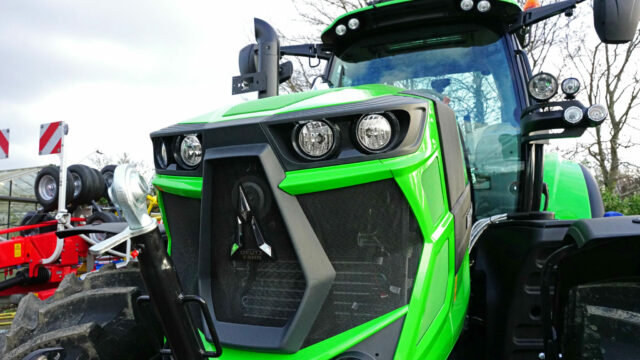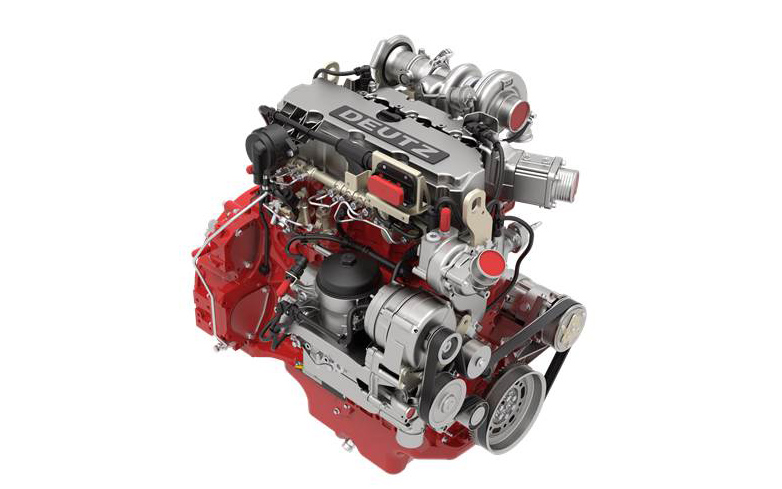Written by Justin Roberts from Agriland
 Earlier this month, Deutz approved its entire TCD engine portfolio for use with alternative diesel fuels.
Earlier this month, Deutz approved its entire TCD engine portfolio for use with alternative diesel fuels.
This means that paraffinic diesel fuels such as HVO (hydrotreated vegetable oil) can now be used to run all Deutz engines that meet the EU Stage V emissions standard.
Deutz highlighted the fact that this includes the TCD 5.2 series which, the company claims, has the power of a six-cylinder diesel with the the efficiency of a four-cylinder design.
These 5.2L engines have a designed output of between 134hp and 227hp in a compact four-cylinder block, putting them right in the most popular tractor power bracket.

All Deutz TCD engines may now be run on alternatives to mineral oil derived diesel fuel
Not only are they now passed for biodiesel but may also be powered by hydrogen or compressed natural gas (CNG), making them suitable for a wide variety of applications where alternatives to mineral oil-derived diesel are available.
HVO is a biofuel produced from biological waste, manure, and used cooking oils and fats, and so may be seen as part of an extended use for foodstuffs and waste rather than competing with food production.
Deutz claims that the use of HVO fuels can reduce the carbon footprint of its engines by up to 95%.
Markus Muller, member of the DEUTZ AG board of management with responsibility for technology and sales stated:
The standard for HVO is EN 15940-paraffinic fuel. Diesel complying with this specification is compatible with fossil diesel, and the two fuels can be mixed and used in any ratio.
HVO is different to what are being called e-fuels. HVO is made from already existing organic material, whereas e-fuels are produced using hydrogen generated with renewable energy.

Energy gathered from wind turbines can be used to produce synthetic diesel
This hydrogen, produced by splitting water through hydrolysis, is combined with carbon dioxide (CO2) harvested directly from the atmosphere, or comes as a waste product of industrial processes.
By extracting energy from the environment through wind turbines or solar arrays, and utilising it to build carbon-based fuels, we are mimicking natural photosynthesis, a three-billion-year-old process.
Also Read: Bobcat compact tractors to come to Europe
The post Deutz goes greener with vegetable oil appeared first on Agriland.co.uk.
Continue reading on the Agriland Website...

This means that paraffinic diesel fuels such as HVO (hydrotreated vegetable oil) can now be used to run all Deutz engines that meet the EU Stage V emissions standard.
Tractor engines
Deutz highlighted the fact that this includes the TCD 5.2 series which, the company claims, has the power of a six-cylinder diesel with the the efficiency of a four-cylinder design.
These 5.2L engines have a designed output of between 134hp and 227hp in a compact four-cylinder block, putting them right in the most popular tractor power bracket.

All Deutz TCD engines may now be run on alternatives to mineral oil derived diesel fuel
Not only are they now passed for biodiesel but may also be powered by hydrogen or compressed natural gas (CNG), making them suitable for a wide variety of applications where alternatives to mineral oil-derived diesel are available.
HVO is a biofuel produced from biological waste, manure, and used cooking oils and fats, and so may be seen as part of an extended use for foodstuffs and waste rather than competing with food production.
Deutz addresses sustainability
Deutz claims that the use of HVO fuels can reduce the carbon footprint of its engines by up to 95%.
Markus Muller, member of the DEUTZ AG board of management with responsibility for technology and sales stated:
“We are offering our customers more than one route to climate neutrality. The approval of additional fuels for our drives complements our E-DEUTZ programme and our hydrogen activities. This represents another big step in our Taking Responsibility sustainability strategy.”
The standard for HVO is EN 15940-paraffinic fuel. Diesel complying with this specification is compatible with fossil diesel, and the two fuels can be mixed and used in any ratio.
Alternatives explained
HVO is different to what are being called e-fuels. HVO is made from already existing organic material, whereas e-fuels are produced using hydrogen generated with renewable energy.

Energy gathered from wind turbines can be used to produce synthetic diesel
This hydrogen, produced by splitting water through hydrolysis, is combined with carbon dioxide (CO2) harvested directly from the atmosphere, or comes as a waste product of industrial processes.
By extracting energy from the environment through wind turbines or solar arrays, and utilising it to build carbon-based fuels, we are mimicking natural photosynthesis, a three-billion-year-old process.
Also Read: Bobcat compact tractors to come to Europe
The post Deutz goes greener with vegetable oil appeared first on Agriland.co.uk.
Continue reading on the Agriland Website...





